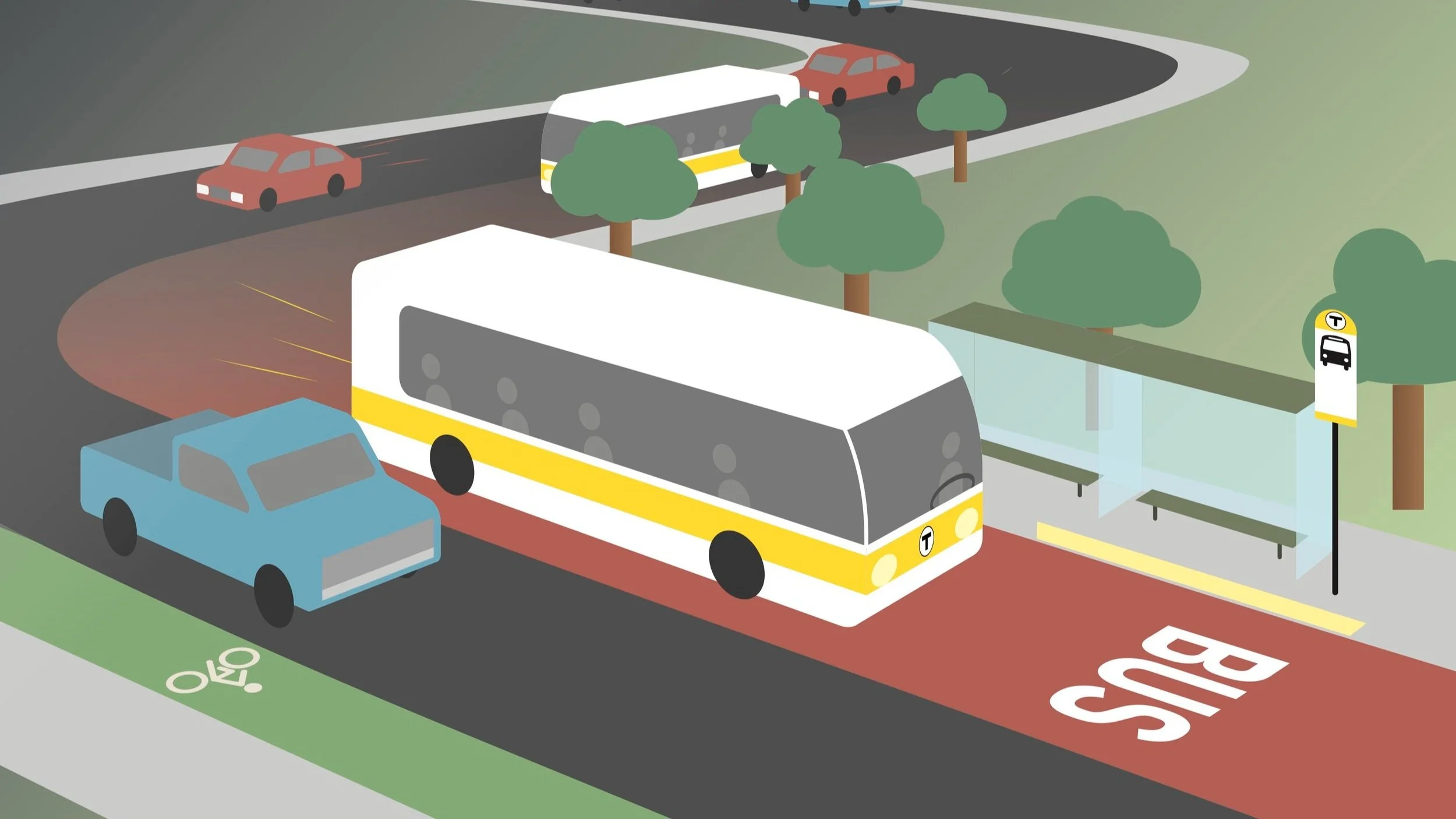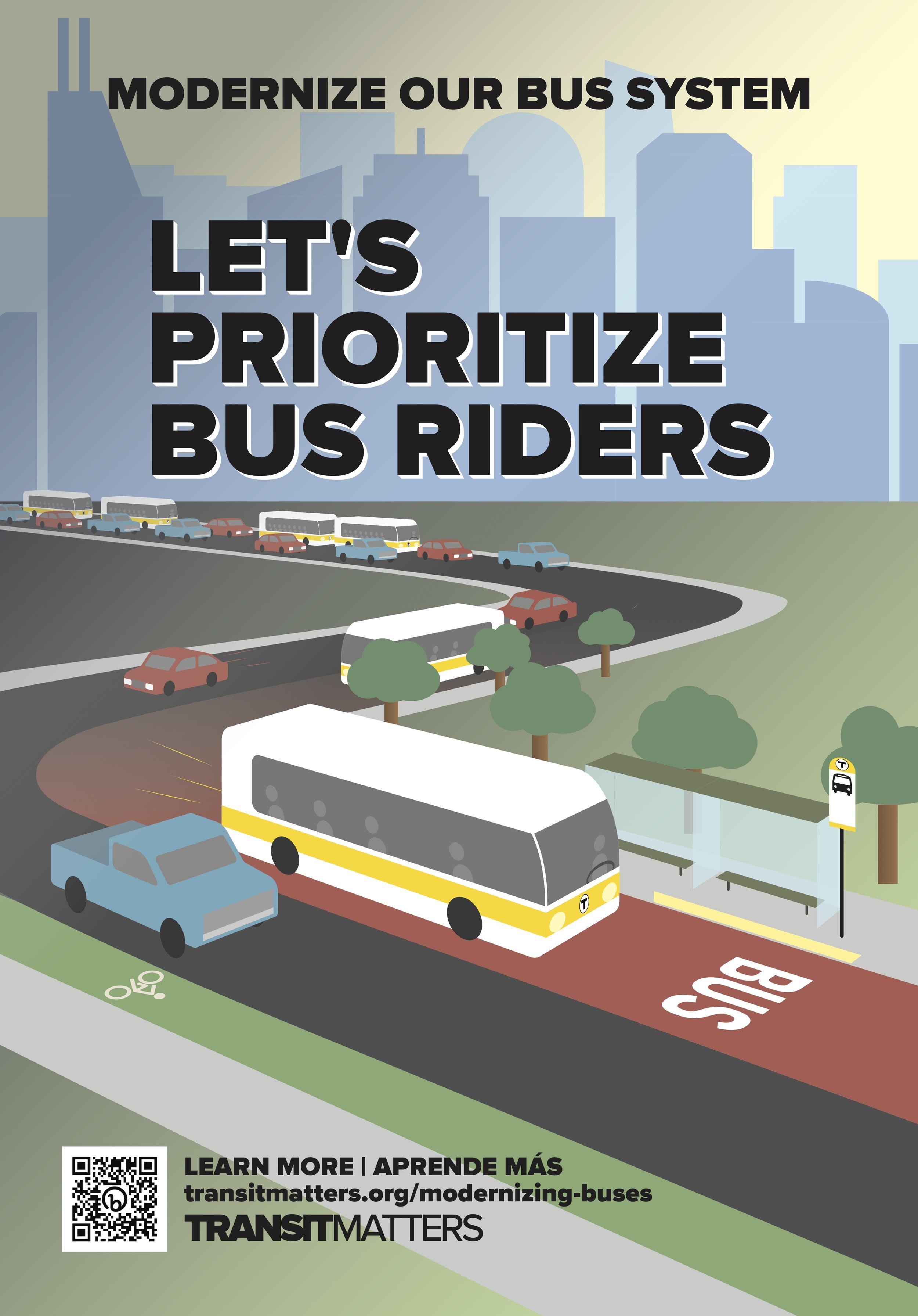
TransitMatters Announces Installation of Advocacy Posters in 18 Bus Stops Across Boston
While all aspects of the MBTA are in disrepair, the bus network is often ignored. TransitMatters aims to change this.
BOSTON, MA, August 8, 2023 – While all aspects of the MBTA are in disrepair, the bus network is often ignored. With continually cut service in tandem with poor operational standards and underinvestment into the infrastructure that supports the functionality of buses, riders have not been prioritized. TransitMatters aims to change this.
Through JCDecaux’s Non-Profit Program, TransitMatters is proud to announce the installation of our poster series “Modernize our Bus System; Let’s Prioritize Bus Riders” at 18 bus stops across Boston.
“The poster is interactive, you can scan [the QR code], and it will bring up the poster in different languages,” said TransitMatters Executive Director Jarred Johnson at the poster launch event in Copley Square. “It will also connect you to the MBTA’s website so that you can give a public comment and not only show your support for bus priority but show your support for improving operational practices so that we don’t have things like bus bunching and so that we have just better operations overall.”
The QR code at the bottom left of the poster brings riders this landing page featuring two auto-email forms: one to tell the T to include better bus operational practices in their plans to improve the bus network and the other to tell the T to continue investing in bus-priority infrastructure. The TransitMatters NextGen Bus team hopes the linked resources will encourage bus riders to take action to ensure that the T prioritizes them in current and future bus planning projects.
The landing page also highlights the roadblocks for better bus trips, explains how to fix them, and creates a stream of action. There is information on bus priority infrastructure and operational practices, such as headway management and pulse points, and how riders can advocate for it. Together, this information can give riders a platform to advocate for themselves, their communities, and their commute.
The TransitMatters NextGen Bus team’s new bus advocacy poster at the Boylston St @ Clarendon St bus stop in Copley Square.
The poster depicts a road suffering from bus bunching and traffic in the background, transitioning to a bus speeding in its own lane in the foreground. Our poster series shows bus riders what their trips could look like if they were the center of bus advocacy.
TransitMatters encourages our friends and followers to take a photo, tag us on social media, and use the hashtag #prioritizebuses if they encounter a poster at a bus stop. We also ask you to please share both Action Alerts with your friends and family!
Media Statement: MBTA Global Speed Restrictions
TransitMatters commends the MBTA General Manager for being transparent with riders about the issues with track conditions and quickly acting out of an abundance of caution.
BOSTON, March 10, 2023 — TransitMatters commends the MBTA General Manager for being transparent with riders about the issues with track conditions and quickly acting out of an abundance of caution. We are also happy to see that new leadership at the Department of Public Utilities is stepping up oversight efforts after decades of inaction. Steps like these are critical to regaining rider confidence and FTA approval.
However, riders deserve quality service. Riders are unfairly bearing the burden of decades of neglect and underfunding. It is critical that leaders on Beacon Hill treat the T's issues as an emergency. The system is in crisis and, nearly a year after the FTA notified the agency that they would be taking over safety oversight, no end is in sight.
The T must be transparent about the schedule for restoring service back to pre-pandemic levels. The slow zones, poorly run diversions, and long headways are untenable. The MBTA has cut bus service for a year and a half and subway service for a year with no timetable to increase service. This is unacceptable and risks permanently driving away ridership.
Accountability is also sorely lacking. Pending the results of the investigation, those in charge of signing off on inspection reports must be held responsible. Riders deserve an active and engaged board that listens to their concerns. The administration should quickly appoint new members to the Board, and reform the rules to ensure the Board provides expertise, accountability and oversight similar to the previous Fiscal and Management Control Board (FMCB).
The region cannot grow its economy equitably, and the Healey Administration cannot achieve its stated carbon emissions reductions goals, without a highly functioning transit system. We urge the Administration and the Legislature to commit to continued transparency and accountability, and provide the MBTA with the resources it needs, in order to ensure a more reliable service that respects its riders and responds to the region’s mobility needs.
For media inquiries, please e-mail media@transitmatters.org.
###
Media Statement: TransitMatters Demands Answers For Beleaguered Red Line Riders; The MBTA Must Regain Trust
MBTA Red Line riders put up with a lot - broken escalators, crumbling staircases, and too-frequent derailments. But lately, anyone riding the rails between Alewife and Ashmont or Braintree has almost certainly noticed that their ride is also quite a bit slower than it should be.
BOSTON, October 24, 2022 — MBTA Red Line riders put up with a lot - broken escalators, crumbling staircases, and too-frequent derailments. But lately, anyone riding the rails between Alewife and Ashmont or Braintree has almost certainly noticed that their ride is also quite a bit slower than it should be. The TransitMatters Slow Zone Tracker shows that a round trip on the Red Line is almost 15 minutes longer than it should be, with no sign of improvement. In a Boston Herald article on October 19th, MBTA spokesman Joe Pesaturo said that “The T’s Engineering and Maintenance Division is working to schedule an appropriate time to perform rail replacement activities." This brief statement is insufficient to address the concerns and anxieties of riders and municipalities that rely on the Red Line. The MBTA must come forward with a complete and specific description of the deficiencies on the Red Line, and be fully transparent about what it will take to fix them and whether the T has the resources to do the job.
Unfortunately, this opaque statement continues a troubling pattern. Whether it was the announcement on the MBTA website, quickly retracted, of a severe north-side Red Line diversion of indefinite length, or the "late completion of overnight work" causing shuttle buses to run during the morning peak hours just last week, the MBTA continues to be secretive and unclear regarding the condition of the Red Line and the work that needs to be done. TransitMatters strongly believes that the MBTA must do three things as soon as possible, and prior to any further Red Line (or any other rapid transit line) disruptions or diversions, to remedy the lack of clarity and help repair rider trust.
Give advance notice of closures and diversions, and provide high-quality alternatives. The MBTA must provide at least three months of notice to municipalities and community stakeholders of closures and diversions on rapid transit lines, to ensure that plans can be made to accomodate diversion routes and provide high-quality alternate accommodations to riders. Those major stakeholders include Massachusetts General Hospital, UMass Boston, Harvard University, MIT, and every business in Kendall Square and the Seaport and Financial Districts whose customers and employees depend on Red Line access. The MBTA should also reroute feeder buses to active rapid transit stations, and provide additional supplemental service on affected routes, including Commuter Rail. The MBTA should also provide meaningful fare mitigation and reduction during any large service disruption.
Be clear about the work being performed and the condition of the infrastructure, before, during, and after the diversion. Before any diversion on a rapid transit line, the MBTA must give a clear statement of the work to be performed, and the ways in which the repairs will benefit safety and service. During the diversion, the Authority must provide regular updates on the work and be transparent about any delays or incidents. After the diversion, the MBTA must be clear about what work was completed, and when, if ever, service will improve. There must not be a repeat of the Orange Line shutdown, with conflicting statements, ever-shifting schedules, and slower service.
Perform work overnight or on weekends, with early closures rather than full shutdowns. Full shutdowns are harmful to the system’s most vulnerable riders, and they are harmful to the economy. The more work that the MBTA can do at night and on weekends with early closures and late openings, the better it is for riders and for everyone in Greater Boston. The MBTA should do what it can to increase its maintenance workforce, invest in permanent staff, and invest in maintenance equipment to increase Maintenance of Way productivity and effectiveness. The best shutdown is the one that doesn't happen.
TransitMatters believes that it's possible to make necessary safety and capital improvements while also minimizing the negative impact on riders. This is national and international best practice. More importantly, the T must develop the skills and workforce to do important work without shutting down whole lines. The alternative is a system that fails its riders at a time when rider confidence is at an ebb, and fails the region at a time when it needs a high-functioning transit system to support a recovering economy.
For media inquiries, please e-mail media@transitmatters.org.
###
Categories
- Children (1)
- Diversions (1)
- Olympics (1)
- MAPC (2)
- Red–Blue Connector (2)
- Urban Design (3)
- Bus (4)
- Fares (4)
- Late Night Service (4)
- MBTA ROC (4)
- Silver Line (4)
- Snow (5)
- Blue Line (8)
- Emergency (8)
- Orange Line (8)
- Public Comment (8)
- Maintenance (9)
- Operations (9)
- Signage (9)
- Fare Collection (10)
- Labs (11)
- Safety (11)
- Planning (12)
- Communication (14)
- MBCR (14)
- MassDOT (14)
- Green Line (16)
- History & Culture (16)
- Red Line (18)
- MBTA Bus (21)
- Commuter Rail (24)
- Advocacy (26)
- Capital Construction (28)
- Politics (30)
- Podcast (35)
- News (38)
- Media (40)
- Funding (42)
- Statements (50)
- MBTA (57)





